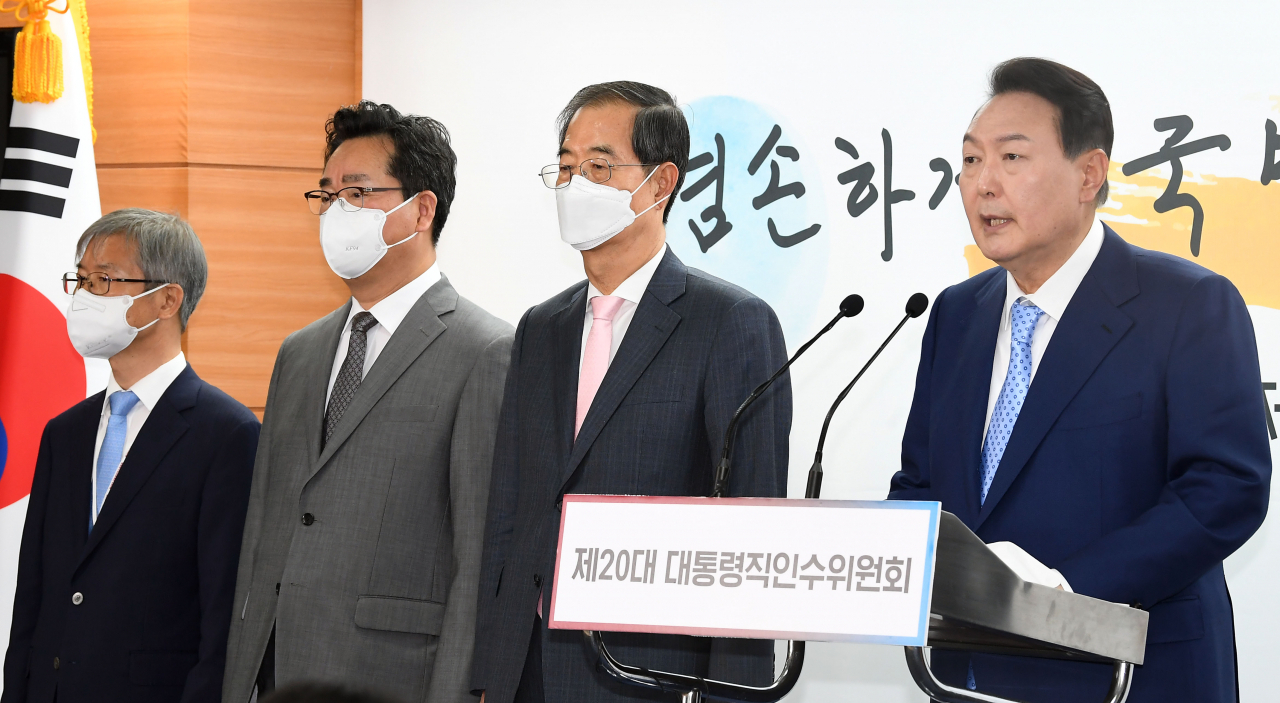 |
President-elect Yoon Suk-yeol (R), alongside Prime Minister nominee Han Duck-soo (2nd from R), holds a press conference at the presidential transition committee's office in Seoul on Thursday, to introduce Labor Minister nominee Lee Jung-sik (far L) and Agriculture Minister nominee Chung Hwang-keun. (Yonhap) |
WASHINGTON -- South Korea's incoming administration will expand the country's diplomatic efforts based on a stronger US-South Korea alliance, President-elect Yoon Suk-yeol said in an interview published Thursday.
Yoon also said he will seek to improve ties with Japan, calling current Seoul-Tokyo relations "the Achilles' heel" of trilateral cooperation between South Korea, Japan and the US.
"The current administration placed too much emphasis on the relationship with North Korea alone, and was rather insufficient in global diplomacy, with some even saying that global diplomacy went missing," the incoming South Korean leader said in his interview with the Washington Post.
"Therefore, we should not only focus on relations with North Korea but, rather, expand the breadth of diplomacy in the E.U. and throughout Asia with the South Korea-US relationship as our foundation," he added, according to the report.
The former prosecutor-general also said his administration will do more economically in the global stage, arguing the world's 10th-largest economy is not doing enough.
"We should take on a greater role in fulfilling our responsibility as one of the top 10 economies in the world," said Yoon.
The president-elect is set to take office on May 10.
With regard to North Korea and its recent series of missile launches that included the firing of an intercontinental ballistic missile (ICBM), Yoon said his administration will adopt a "two-track approach" -- one to treat North Korea as the main enemy and the other to help the people of North Korea.
"There are two reasons I call North Korea the main enemy. North Korea broke its [self-imposed] moratorium [on long-range and nuclear tests], and tested a hypersonic missile, which means that the country's tests for nuclear weapons delivery has reached a serious level," Yoon was quoted as saying, stressing a need for South Korea to "establish our defense policy and build operational intelligence."
"Regardless of the circumstance, we are the same race. So I will provide humanitarian aid [to North Korea] at any time. We will always keep open the conversation channel that we need to solve problems like the military threats," added Yoon.
To better tackle the North Korean nuclear issue, Yoon said his administration will work to improve South Korea-Japan relations, which he said in turn will enhance South Korea-Japan-US trilateral cooperation.
"Our weakened relationship with Japan is the Achilles' heel of South Korea-US-Japan cooperation," said Yoon. "A future-oriented development of South Korea-Japan relations is beneficial to not only Japan but also brings huge benefits to the people and companies in South Korea."
Seoul-Tokyo relations have been at their lowest ebb since mid-2019 when Japan took economic steps believed to be aimed at retaliating against Seoul court decisions ordering Japanese firms to pay compensation to Korean workers forced into labor during Japans' 1910-45 colonial rule.
Yoon accused outgoing President Moon Jae-in's Democratic Party of exploiting the South Korea-Japan relationship for domestic politics, adding, "dragging the decades-old colonial rule back on to the table hurts the bilateral relationship."
He also emphasized the importance of working with Quad members on issues related to COVID-19 vaccines, climate change and emerging technologies "to create a synergy with Quad countries."
The Quad is a grouping between Australia, India, Japan and the US that is widely seen as being US-led to counter China in the Indo-Pacific region. Seoul has remained reluctant to join the group, fearing possible economic retaliation by Beijing, its largest trade partner.
"When it comes to economic issues, South Korea and China are important trade partners to each other. Economic issues are important to both countries, and it is not unilateral," said Yoon.
" China's unilateral retaliatory measures could hurt our economy to an extent, but I believe China knows very well that such an unfair action would hardly be beneficial to China either or sustainable for them," he added. (Yonhap)







